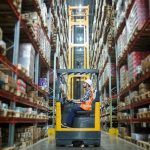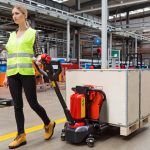
Six Steps to Ensuring Forklift Safety
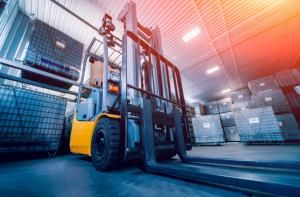 If your operations include forklifts, your need for safety precautions is intensified.
If your operations include forklifts, your need for safety precautions is intensified.
Here are six steps to help ensure safe forklift operations in your workplace or job site.
The Need for Forklift Safety
The requirement to operate a forklift safely is a very important matter that can’t be ignored. There are over 1 million forklifts operating on loading docks, in warehouses and other workplace settings across North America. This is a significant number of operating units and a large number of potential safety risks.
What is equally surprising is the possibility of a fatal injury when a forklift is involved in an overturn accident, or if they cause racking to collapse because of a collision.
Forklift Safety Training
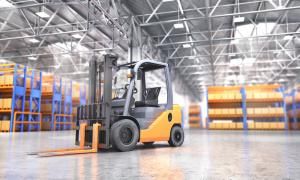 The overarching step in safe operation of forklifts is the proper training in the risks, the functional operation and the rules of movement in and around the workplace.
The overarching step in safe operation of forklifts is the proper training in the risks, the functional operation and the rules of movement in and around the workplace.
Since a forklift is a form of industrial vehicle, it is important to note, as a matter of compliance, that are there also federal and provincial training standards that must be met.
Training on the operation of a forklift starts with an awareness of the risks involved. Next, is in-depth training on the basic operation and safety guidelines, along with the rules that cover safe movement within the workplace. All of these teaching points must be learned before an operator can be granted their forklift license.
Apply the Training Daily
An important application of the training is to make risk awareness an everyday activity. Constant vigilance is required.
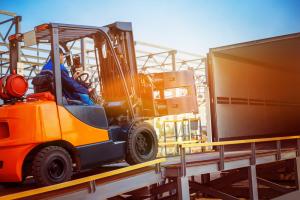 Supervisors and forklift operators should maintain an awareness of safety risks, and communicate the importance of safe operation every working day. This awareness and continuous effort for safety must continue every day and operators need to always be aware of some common risks. The most basic and common things that a forklift operator needs to keep in mind at all times to keep their workplace safe are:
Supervisors and forklift operators should maintain an awareness of safety risks, and communicate the importance of safe operation every working day. This awareness and continuous effort for safety must continue every day and operators need to always be aware of some common risks. The most basic and common things that a forklift operator needs to keep in mind at all times to keep their workplace safe are:
- Always secure loads
- Avoid imbalanced loads that may cause the forklift to tip over
- Avoid operation of a forklift by an untrained worker
This is a good start in the right direction of forklift safety.
Load the Forklift Properly
It is important to avoid overloading the forklift to avoid an overturn accident.
Load balance is essential to safe operation. The forks should always be as far under the load as to adequately balance the load during the actual lift. Proper load balance includes every effort to keep in the load a relatively low position and drive in reverse in situations where the load may block the forward view. When handling a large load, drivers should reduce their speed and avoid making sudden sharp turns.
Stay in the Correct Lanes
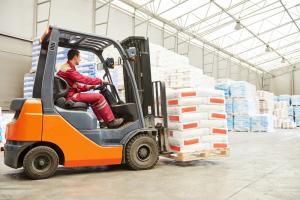
Proper forklift movement within the workplace is designated with safety color codes for marking various hazards.
It is important for continued safety to operate the forklift in the designated areas and pay attention to areas colored for specific risks. This way operators will know what to be on the lookout for in any given area.
As an example, lanes/sections colored Red are to designate fire-related hazards; Yellow often designates caution for other physical hazards.
Forklift Traffic Control
An important safety step is to make sure Forklift “traffic” is controlled. This means including stop signs and speed limits.
The concept of traffic control applies to all those in the workplace to be alert to potential risks of forklift operation. This includes all workers who are working in the vicinity of a forklift, not just the operator.
Forklift Equipment Maintenance
A forklift is an important workplace vehicle and must be in proper working order to ensure safe operations can continue.
Forklifts come in engine variations of both electric and gas powered and require regular maintenance. The lifts should be inspected daily to ensure reliable performance and avoid any mechanical breakdown that may lead to an accident or spill. If there are any issues found with a forklift, then it needs to be locked out, tagged out and sent for repairs.
How ACT Can Help
Given the potential for serious injury to forklift operators and those that work around them in the workplace, it is important to have an awareness of these essential forklift safety risks and accident prevention steps. It is also important to make sure that any employee who has to operate a forklift to perform their daily job duties is properly trained and fully licensed.
Advanced Consulting & Training offers forklift safety training and certification courses. To find out more, browse our course offerings starting from the side of this page.
Contact us today to find out more about how ACT can help you.

